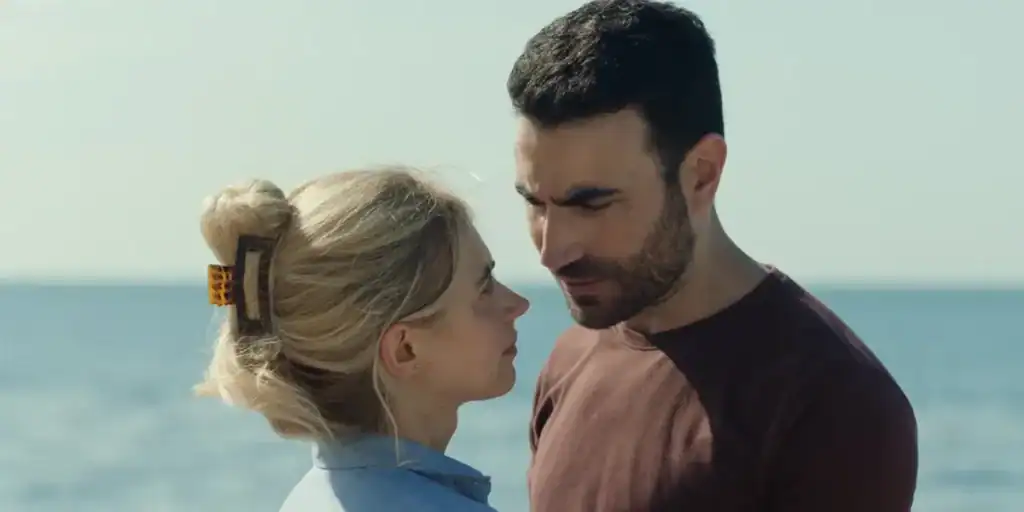“It probably became therapy for us, to be honest.”
That is how filmmaker William Bridges described making All of You, the romantic dramedy that he co-wrote with Emmy winner Brett Goldstein. While Bridges certainly wouldn’t be the first creative to describe filmmaking as a form of mental self-care, it’s a fascinating lens in which to view this particular film. Starring Goldstein and Imogen Poots, All of You follows two best friends whose lives are shaped by one’s participation in a “soulmate” test, where an undefined technology promises to match someone up with the love of their life. What neither Simon (Goldstein) nor Laura (Poots) realizes until they’re well down the road is that they could very well fill that role for each other. Over the course of years, Simon and Laura come to grips with their chosen paths, their deviations from their undeniable connection, and the choices they must make to preserve both.
Simon and Laura would likely benefit from some professional intervention. If that’s true, how did Bridges come to see his film, where his protagonists are in desperate need of therapy, as a form of therapy for himself?
It starts with a multi-year intake session with Goldstein. Bridges and Goldstein met roughly 15 years ago and have worked on projects together since then, including the 2015 film SuperBob and the 2020 sci-fi anthology series Soulmates. Their collaborations naturally led to conversations about their personal and romantic lives, which they were at different stages in.
“I was in a long-term relationship,” Bridges recalled in our interview. “[Brett] was single at the time, and he asked me, ‘How do you know that she’s the one? Do you know?’ And I was like, ‘I don’t. I hope she is, but I don’t know.’ And then we said, ‘But what if you could know? How would it work? What if you could take a test and find out for sure if they are?”
Bridges continued, “And that was the conversation that started it all, and we just unpacked these two characters within that conversation on that day. [It was] two people walking down the street, they’re best friends, one’s in love with the other, lending money to take this test, and that became the beginning of the movie 15 years ago.”
They took that beginning and turned it into a short film, titled For Life, starring Goldstein and Laura Haddock. They wrote and shot the film within the span of a month, developing what would eventually become a “proof of concept” for All of You. A lot has happened to both men in the space between the two films: Bridges received an Emmy for writing the Black Mirror episode “U.S.S. McAllister.” Meanwhile, Goldstein became a breakout star as the beloved curmudgeon Roy Kent on the Apple TV+ series Ted Lasso, winning a pair of Emmys himself. Amidst their massive successes, they continued noodling on the characters who would eventually become Simon and Laura, finding themselves imagining what their lives would be like from that moment on the street.
“Whenever we caught up, we always talked about these characters,” Bridges said. “Not as a feature film idea, just as people checking in on their lives every couple of years. We went to a wedding and I was like, ‘Oh, wouldn’t it be weird if they bumped into each other?’” (That moment actually occurs in All of You.) “We still had these characters that we felt compelled to tell a story about, because we’d mapped out their lives for the next 20 years, and so we decided to stop talking about it and tell a story because we knew these characters inside out.”
Part of what makes All of You unique is its approach to telling Simon and Laura’s story over multiple years rather than a set place and time. We see how they change — Laura marries her test-approved soulmate and has a child with him — and how they remain the same through their dry humor and gentle handling of each other when the humor doesn’t suffice.
Bridges chose an extended timeline for Simon and Laura’s story on purpose. “We wanted to tell a love story rather than a romance story,” he explained. “There’s romance in [the movie], but I think romance exists in short periods of time. I wouldn’t necessarily argue that it exists over years and years. All these other elements come into a love story: the hard bits, the commitment, the sacrifice, all that, for me, makes up the idea of love, and we wanted to tell that story. And that takes time to explore that. That’s why we wanted to set it over the course of their lives, because we wanted to look at lots of different aspects of how someone can love someone.”
Indeed, how Simon and Laura love each other over the course of their lives changes constantly, reflecting the best and worst parts of themselves. Laura’s challenge in loving Simon is reconciling that with her love for her husband and daughter. She remains adamant that she has no plans to leave her family for Simon, essentially leaving Simon in limbo as they embark on a passionate but troubled love affair. The film poses difficult questions to Laura: Which love matters more? Is it the love of the person society tells you is your soulmate, someone with whom you’ve built a genuinely good life? Or is the person who you feel is your soulmate, even though you would be upending everything you’ve ever known?
Bridges unpacks the concept of soulmates in this way: “The soulmate you’re matched with is the person you will love more than anyone else, and they will love you more than they love anyone else. But what if you care about someone else as well? That happens. You can love more than one person at the same time. What problems does that create in a world where there is an absolute? And what happens to that idea of love, that you can have feelings for someone else?”
“That’s why we created the premise,” Bridges said. “To ask that question about that kind of love that we all know exists. We all know people who have experienced those kinds of feelings or been in those kinds of relationships. We wanted to have a look at that love without judging it, without saying, ‘This is wrong, this is right.’”
Focusing on Laura, Bridges explained that “she has got a lot to lose, because she’s got a world telling her that she has this life that everyone’s supposed to have, and yet she has these feelings for someone else. And she has to wrestle with that.” Meanwhile, Simon is living a life defined by what he could’ve had but doesn’t because he doesn’t tell Laura how he feels before she takes that test.
“He’s quite closed off in the beginning,” Bridges says of Simon. “He then learns to be open about how he feels with her because he is closed off about how he talks about his relationships, and that’s the problem he needs to get over. And he gets there.”
For all the ruminations about the psychologies of these two characters, and how they interact with tangibles and intangibles of love, All of You is technically a sci-fi film. The film is set in a world where romantic capability is assessed digitally, and it wouldn’t be a leap to assume that generative AI plays a part in this alternate universe. While the film bears some thematic similarities to his work on Black Mirror, Bridges wasn’t interested in foregrounding the science behind the soulmate test, or any high-tech element presented in the film.
“We wanted to create a sci-fi element to be able to talk about relationships that we understand today,” Bridges explained. “I think that’s what good sci-fi does. You could set something thousands of years in the future, but you’re really talking about people today when you’re talking about good sci-fi.”
Bridges continued, “The other thing is, technology is amazing for 5 minutes, and then it’s lived in. We don’t walk around going, ‘Oh my God, mobile phones!’ They’re an incredible piece of technology, but we’re not amazed by them anymore. So, we wanted the world to feel realistic, where all of these things still exist, and it’s just part of the fabric of how you live your life. We wanted to treat technology in the movie how we treat technology in life.”
Without technology leading us into a death spiral of doomscrolling that foretells the further degradation of our collective mental health, that leaves Simon and Laura. They are a thoroughly modern and messy couple in a vaguely futuristic landscape, and that contrast allowed them to fit easily within the periphery of their creators’ lives. For Bridges, it’s why they have stuck around for nearly two decades, evolving from a casual musing to a full-fledged feature film.
“We felt like we knew them,” Bridges said of his soulmates. “They became a conduit to talk about our own experiences in interesting ways, the different types of relationships that we’d come across, how we felt about our own lives, the milestones that they hit that we recognized in ourselves.”
In other words, therapy.
All of You premieres on Apple TV+ on September 26th.
A late-stage millennial lover of most things related to pop culture. Becomes irrationally irritated by Oscar predictions that don’t come true.






